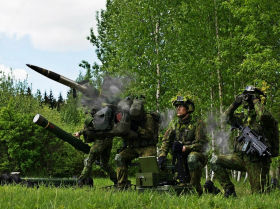Analytics, Baltic, EU – Baltic States, Financial Services, Funds, Industry, Latvia, Markets and Companies, Security, Statistics
International Internet Magazine. Baltic States news & analytics
Monday, 02.02.2026, 06:02
Think tank: Baltic defense budgets growing faster than in any other region globally
 Print version
Print version |
|---|
Latvia, Lithuania and Estonia increased spending on new
defense equipment from 210 mln U.S. dollars in 2014 to 390 mln dollars in 2016.
Together by 2018, the three countries are expected to spend around 670 mln
dollars a year on new equipment.
"The profile of defense spending in the Baltics has
changed dramatically in the past two years," said Craig Caffrey, principal analyst at IHS Jane's. "Their defense budgets will all be over two % of
GDP by 2018, and each country will have doubled or tripled their budgets from
10 years ago. In 2005, the region's total defense budget was 930 mln dollars.
By 2020, the region's defense budget will be 2.1 bln dollars. This growth is
faster than any other region globally."
Latvia and Lithuania have been the two fastest growing
defense budgets in the world since 2014, according to IHS Jane's analysis. The high rates of growth will be sustained
until 2018.
According to IHS,
the defense spending of Estonia will grow to 501.51 mln dollars by 2019 from
263.49 mln dollars in 2005. Latvia's defense spending amounted to 279.56 mln
dollars in 2005 and is set to rise to 613.85 mln dollars in 2019. The
corresponding indicators for Lithuania are 386.47 mln and 892.01 mln dollars.
"The increase in defense spending in the Baltics is
largely linked to the growing confrontation between Russia and the West, often
described as the 'new Cold War'," said Alex Kokcharov, principal analyst at IHS Country Risk. "We have seen political confrontation
between Russia and the West in the past two and a half years escalate to
military assertiveness and we don't see this ending anytime soon."
"Military exercises carried out by Russia and NATO have
increased in frequency, as have various aviation and marine incidents in the
Baltic and Black Seas," Kokcharov said. "Russia very much views these
areas as its immediate frontier."
"While we do not expect Russia to become involved in a
conventional interstate war with the West, including NATO member states, it is
likely that the confrontation will continue for a number of years,"
Kokcharov said. "This confrontation will likely include elements of
military intimidation, making immediate Russian neighbors concerned."
The 28.6 % increase in the defence budget for 2015, the
largest since 2002, is expected to represent the zenith of Russian defense
expenditure for the foreseeable future, according to the IHS Jane's report.
The 2016 budget included the first reduction in Russian
defense expenditure seen since the late 1990s. With further growth required in
order to fund the full extent of the 21 trillion ruble investment planned for
the 2011-2020 State Armament Program, it seems likely that some of the
modernization goals will need to be deferred into the new 2016-2025 program,
expected to be formalized this year.
"On the defense trade side, Russia has been steadily
losing market share," said Ben
Moores, senior analyst at IHS Jane's.
"Russia, once previously dominant in the world's second largest import
market, has been steadily losing market share in India to Israel and the U.S.
over the past five years."
Russia has a large backlog with China over the next decade,
which is primarily related to SU-35 deliveries. However, this belies the trend
of exports from Russia to China in coming years. Russian exports to China, once
a huge market for Russia, are in steady decline as China has developed parallel
industrial capabilities.
"Russia is well positioned in high growth markets such
as Vietnam, Indonesia and India," Moores said. "However, it faces
increasingly competition in all three from North American and European
companies and will have to adopt new strategies to retain market share."








 «The Baltic Course» Is Sold and Stays in Business!
«The Baltic Course» Is Sold and Stays in Business!

